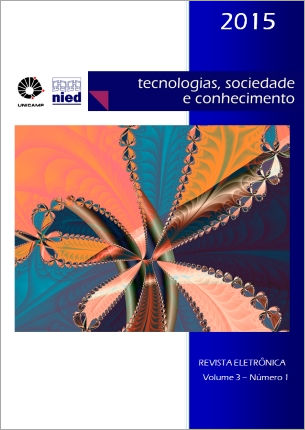Abstract
Through the Social Studies of Science and Technology, concepts such as neutrality and determinism of technology began to be questioned. From these questions arose several conceptions of technology in modern society, including the Critical Theory of Technology. This theory believes that technological artifacts are socially constructed and therefore loaded with values. Currently, these values represent a hegemonic vision that excludes the majority in favor of the power of a minority. In response to this situation, it becomes necessary to
adopt practices that allow democratic participation of society in the technical design process. The Participatory Design, applied following a specific ethic, has tools that enable user participation and the design of technologies with broader values.
References
AIBAR, E. La Vida Social de las Maquinas: Origenes, desarollo y perspectivas actuales. Reis, vol. 76, p. 141–170, 1996.
BJERKNES, G.; BRATTETEIG, T. User participation and democracy: a discussion of Scandinavian research on system development. Scandinavian Journal of Information Systems, v. 7, n. 1, p. 1–26, 1995.
BLOMBERG, J.; KARASTI, H. Ethnography: Positioning Ethnographic within Participatory Design. In: SIMONSEN, J.; ROBERTSON, T. (Eds.). Routledge International Handbook of Participatory Design. New York: Routledge, 2013, p. 86–116.
BØDKER, K.; KENSING, F.; SIMONSEN, J. Participatory IT Design: Designing for Business and Workplace Realities. Cambridge: The MIT Press, 2004.
BRANDT, E.; BINDER, T.; SANDERS, E. B. Tools and Techniques: Ways to Engage Telling, Making and Enacting. In: SIMONSEN, J.; ROBERTSON, T. (Eds.). Routledge International Handbook of Participatory Design. New York: Routledge, 2013.
BRATTETEIG, T. et al. Methods: Organizing Principles and General Guidelines for Participatory Design Projects. In: SIMONSEN, J.; ROBERTSON, T. (Eds.). Routledge International Handbook of Participatory Design. New York: Routledge, 2013, p. 117–144.
CUTCLIFF, S. H. La Emergencia Histórica de CTS como campo académico. In: Ideas, Máquinas y Valores. [s.l.] Antrophos Editorial, 2003, p. 7–24.
DAGNINO, R. Estudos sociais da ciência e tecnologia e política de ciência e tecnologia: abordagens alternativas para uma nova América Latina. Campina Grande: Editora da Universidade Estadual da Paraíba, 2010a, p. 253–280.
DAGNINO, R. O Pensamento Latino-Americano em Ciência, Tecnologia e Sociedade (PLACTS) e a obra de Andrew Feenberg. In: NEDER, R. T. (Ed.). A Teoria Crítica de Andrew Feenberg: Racionalização Democrática, Poder e Tecnologia. Brasília: Observatório do Movimento pela Tecnologia Social na América Latina / CDS / UnB / Capes, 2010b, p. 25–48.
DAGNINO, R.; DIAS, R. A Política de C & T Brasileira : três alternativas de explicação e orientação. Revista Brasileira de Inovação, v. 6, n. 2, 373–403, 2007.
FEENBERG, A. Critical Theory of Technology. New York: Oxford University Press, 1991. FEENBERG, A. Subversive Rationalization: Technology, Power, and Democracy. Inquiry: An Interdisciplinary Journal of Philosophy, v. 35, p. 301, 1992.

This work is licensed under a Creative Commons Attribution 4.0 International License.
Copyright (c) 2016 Tecnologias, Sociedade e Conhecimento


